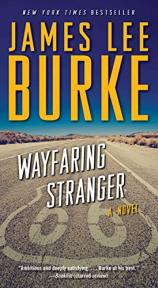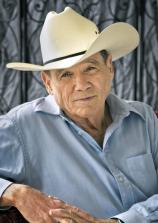Wayfaring Stranger
Review
Wayfaring Stranger
If I may, let me begin at the conclusion: my immediate reaction upon finishing James Lee Burke’s latest book was that, in five decades or so, people will read it, speak of it, and study it in the same manner as they do THE GREAT GATSBY. The two novels touch on some of the same topics, but in wildly varied geographic locations and from markedly different viewpoints. While WAYFARING STRANGER falls roughly next to, if not within, Burke’s Hackberry Holland canon, it is a work that ultimately stands alone. It is perhaps his most ambitious book and certainly one of his very best, a feat that would be remarkable at any stage of an author’s career, but all the more so at this advanced date.
"Burke recalls a time and place that has all but disappeared, for better and worse, grasping it and recalling it to life with writing so pure, clear and clean that it is impossible to read without repeatedly bringing tears to one’s eyes, admiring how beautiful it is. If you can read only one book this year, it must be this one."
WAYFARING STRANGER is told through the eyes and voice of Weldon Avery Holland, the grandson of an ancient but legendary lawman who, in the prime of his career, brought the notorious badman John Wesley Hardin to rough justice. We first meet young Weldon in 1934 when he is 16 years old, living in what he describes at one point as “genteel poverty” on a farm with his mother and his grandfather, Hackberry Holland. Weldon’s father had walked down the road in search of work and has not been seen since, leaving Weldon at a rough point between boy and man and the taciturn and all-too-blunt Hackberry as the flawed but fearless man of the house.
The hallmark of Weldon’s adolescence is an encounter with the Clyde Barrow gang, who, while on the run, set up a clandestine camp on the edge of the Holland farm. Though Weldon’s interactions with Bonnie and Clyde and company each take but a few minutes, they indelibly mark him during his life in ways that no one, including the reader, could predict otherwise. The other major turning point in Weldon’s life occurs during his combat service in World War II, when he rescues Hershel Pine, an Army sergeant who later becomes his business partner, and Rosita Lowenstein, a concentration camp prisoner and his future wife.
Weldon’s defining trait is his loyalty to those whom he loves, a quality that does not deflate or disappear in foul weather as he demonstrates time and again throughout the book. Weldon and Pine go into the oil business together, using Pine’s (not always logical) instincts and observations, along with Weldon’s business acumen and contacts. Their success --- and Weldon’s marriage to a Jew of questionable political pedigree --- attracts some hostile attention not only from overt foes but also from those who otherwise would be regarded as allies. Things become even more complicated when Pine’s wife, a southern woman of modest means, attracts the unwholesome attention of a Hollywood mogul.
The movie and fledgling oil industries collude and collide, and Weldon finds himself in the middle of a tempest that will destroy him and, more importantly, those to whom he has sworn friendship and love. All seems lost but for an intervention that not only appears unlikely but also may be far too late to have any effect. Regardless, Weldon is prepared to soldier on, no matter what price he may have to pay personally.
At the very least, WAYFARING STRANGER is one of the Great American Novels. Burke recalls a time and place that has all but disappeared, for better and worse, grasping it and recalling it to life with writing so pure, clear and clean that it is impossible to read without repeatedly bringing tears to one’s eyes, admiring how beautiful it is. If you can read only one book this year, it must be this one.
Reviewed by Joe Hartlaub on July 18, 2014
Wayfaring Stranger
- Publication Date: April 28, 2015
- Genres: Fiction, Historical Fiction, Historical Thriller, Suspense, Thriller
- Mass Market Paperback: 464 pages
- Publisher: Pocket Books
- ISBN-10: 1476710805
- ISBN-13: 9781476710808





